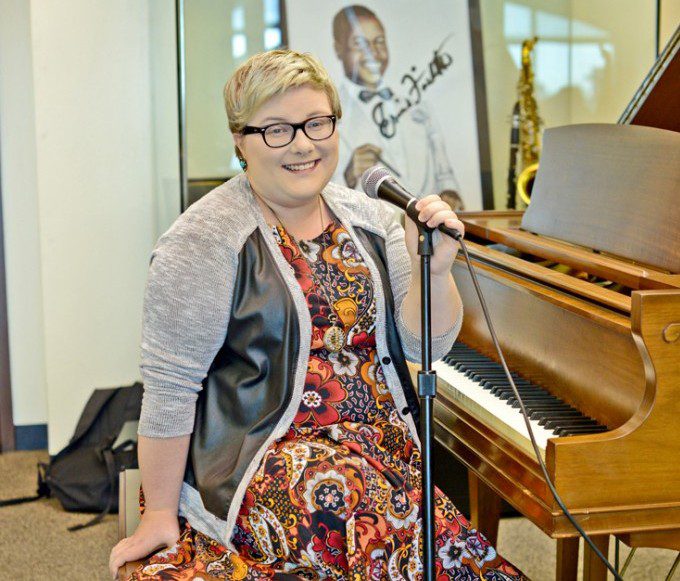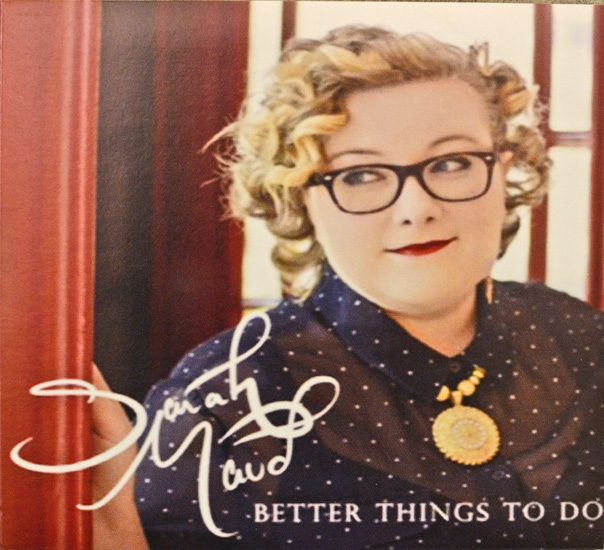
It’s a toss-up as to which is more impressive: The fact that the artist behind the album Better Things to Do is still an undergraduate at The University of Tulsa or that the new disc – a hearty and satisfying jazz platter seasoned with reggae, pop and other musical ingredients – began life as a school project.
That artist, Sarah Maud, credits professor Vernon Howard, TU’s director of jazz studies, for helping take Better Things to Do from academic to commercial. On the CD jacket, Howard and Maud are listed as co-producers.
“Vernon has always been a huge supporter of mine, helping me with everything,” Maud explains. “Also, I realized I needed something to send out to grad school and something to sell and something to help me get gigs – which has been hard, because I didn’t have any recordings of myself and I’m really young and it’s easier just to hire the people you’ve already been hiring. I’m only 21. I get it.
“So I needed something to show people [who run music venues],” she adds, “and this album, for me, is really, really safe. I didn’t do anything too crazy. I guess ‘Escolha’ is the one that’s out there.”[pullquote]”The discipline of classical music was so beneficial to me in writing music and being professional and doing well in a rehearsal setting with a group of people. The only rough thing about it was that you learn [to be] no-nonsense – and when you’ve got a group of jazz people, there’s a lot of nonsense.”[/pullquote]
One of three original songs on the disc, “Escolha” (which, she notes, is Portuguese for “choices”) is a wordless melody she originally composed as part of an ear-training exercise for one of Howard’s classes. Another is the title track – a bouncy, reggae-flavored tune.
“Actually,” she says with a chuckle, “that was a ukulele song, and on the first recording of it that I did, it’s disgustingly adorable. It wasn’t even reggae.
“There was a friend of mine who was in a film-scoring class here, and he needed a song to record,” she says. “I’d written that song a long time ago on my ukulele, and we decided to do it. Jordan started playing some reggae behind it, and it was just kind of perfect.”
“Jordan” is Jordan Hehl, the Tulsa bassist who plays and sings on the standard “Say It Over and Over Again,” a track from Better Things to Do. He plays with Nicholas Foster on drums and Paul Humphrey on guitar. Like Maud, Hehl and Foster are in the forefront of a new wave of Tulsa jazz artists, seen and heard often at the Oklahoma Jazz Hall of Fame’s Jazz Depot as well as on other stages around Tulsa. The three, in fact, have performed together for a couple of years, and a strong bond has developed among them.
“I don’t like to admit it, because he’s basically my [musical] brother,” Maud says, “but Jordan has been the biggest help ever to me here in Tulsa. He was a senior when I came here as a freshman, and Nicholas was a sophomore. Those two are the ones who helped me get started.

“I met Paul here at TU,” she adds. “There are certain people you click with, and with Nicholas and Jordan, Paul just kind of naturally fit.”
The trio, along with Maud, form the Maud Squad, whose repertoire ranges from songs by the rockers Blondie and Radiohead to jazz and pop numbers. Backed by Hehl’s bass and Foster’s drums, Maud’s voice becomes the group’s only lead instrument.
“It takes a lot of listening,” Maud said before Maud Squad’s debut performance at the Jazz Depot in September 2013.
“When you’re a vocalist, you sometimes find yourself having a kind of crutch, and for a lot of vocalists, it’s a chord. If you forget a melody line or something, and you hear the chord, then you’re going to find someplace to go. But here, you don’t have a chord to fall back on. In a lot of it, I end up being the chordal instrument with my voice. It’s a really cool sound if you can pull it off.”
The idea of the human voice as an instrument is something Maud thinks about a lot. The concept worked its way into her head back in her hometown of Coweta, where she became heavily involved in school band programs after a childhood spent singing southern gospel in church with her mother and sister.
“My mom would explain things like harmony to me,” she recalls. “And once she explained what it was, it was really easy for me, because I had a natural ear for it, and it was really fun to do.”
She “kind of forgot about vocals” after joining the school band as a sixth grader, playing a classical repertoire on a French horn.
“I was so focused on that, and I loved it,” she says. “I still love it today. I’m so glad my instrument was French horn, because you have to have a good ear. Also, the discipline of classical music was so beneficial to me in writing music and being professional and doing well in a rehearsal setting with a group of people. The only rough thing about it was that you learn [to be] no-nonsense – and when you’ve got a group of jazz people, there’s a lot of nonsense.”
She laughs.
“Here [at TU], I do classical vocal as well, and French horn really helped me with that. It seems like everything I did with the French horn was exactly what I needed to do vocally for classical music.”
In ninth grade, Maud began playing trumpet in the school jazz band. It helped her remember not only being enthralled as a child by Billie Holiday’s version of “What A Little Moonlight Can Do,” discovered in her mother’s record collection, but also the singing she’d done in church.
“Playing the trumpet was making me want to sing again, and in my junior year of high school, two of my friends basically made me go sing in front of my band director,” she remembers. “So I’m in his office, I’m terrified, and I start singing ‘I’ve Got You Under My Skin.’ He didn’t say a word to me. All I saw was him kind of sink back into his chair with a relaxed look and a smile on his face, and that said everything to me.”
From there, she not only began singing with the school jazz band, but she started composing songs as well. In 2010, just before the start of her senior year, Maud attended a jazz camp co-sponsored by TU and the Oklahoma Jazz Hall for Fame, where “I met some really great people who were so helpful,” she says. “And that just started everything for me in Tulsa.”
Through it all, she never lost sight of the idea of using her voice as a musical instrument.
“I’ve always been very articulate about how important it is to me to keep that idea of musicianship, because I’ve always been a musician,” she notes. “Saying a vocalist is a musician is not a new concept or idea. It’s a true statement. You are a musician. Your instrument is you.”
Sarah Maud’s Better Things to Do is available at the Jazz Depot, and her shows are available on iTunes.






















